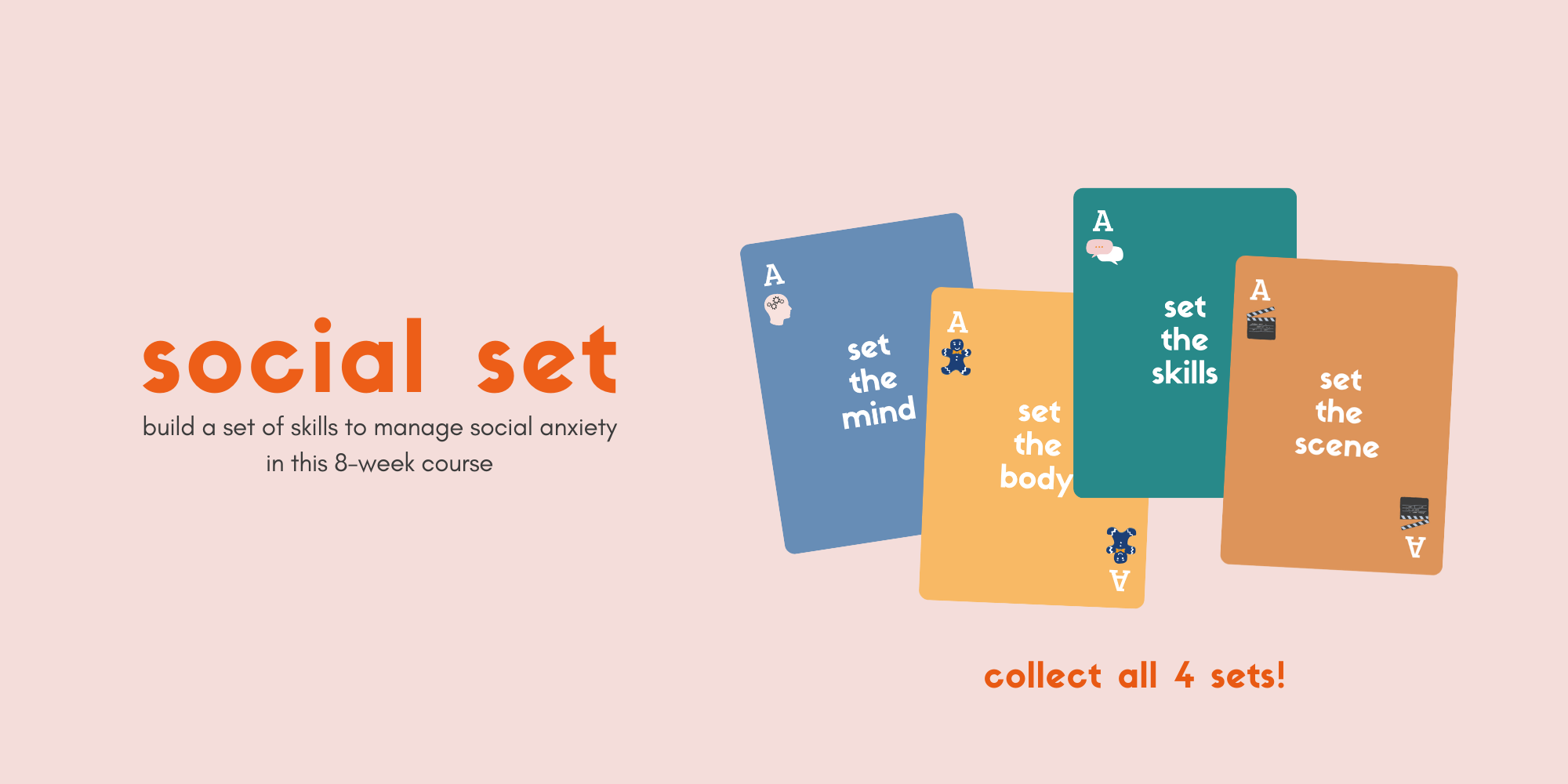SOCIAL SET - social anxiety treatment
Social Set is an 8-session course designed to help those who experience social anxiety. This course helps you to curate a set of skills that you can draw upon to improve your nerves in any social situations. It is based on years of experience working extensively with individuals with social anxiety, as well as up-to-date research.
About Social ANXIETY
Social Set is an 8-week course designed for those who experience social anxiety. Social anxiety isn’t just being shy or being introverted - it’s actually quite debilitating in nature. Some signs that you may have social anxiety include:
Worrying that others will judge you negatively, or that you will be embarrassed or humiliated.
Intense and persistent anxiety at the prospect of being in situation where others may judge you, and this anxiety is out of proportion to the situation.
Avoidance of situations that trigger anxiety or, if unavoidable, are endured with intense anxiety.
The anxiety or distress affects your daily functioning and your quality of life. Some examples of how social anxiety affects people can be seen below.
Sami the student
Sami is a final year university student who finds that her longstanding anxiety really gets in the way of her life. She has chosen a course that leads to a career that doesn’t involve a lot of contact with people. Within her course, she chooses units that don’t have any group assignments or public speaking components. Unfortunately, Sami’s units also have a class participation component, but her intense anxiety means she would rather fail that component than speak up. She has very few friends - ones who have stuck around over the years long enough that she knows that they like her. Making new friends is scary - she avoids small talk due to not knowing how to maintain conversations Sami is also worried about how she will get a job next year given that job interviews are highly anxiety-provoking for her.
Will the worker
Will is a professional who has been working for a few decades now. He has also lived with social anxiety for a very long time. In spite of being quite senior at work, Will worries that others think he’s incompetent, and he spends his nights lying in bed going over conversations he had that day. Will also experiences imposter syndrome, and to live up to what he thinks others expects of him he prepares excessively and is prone to burnout. Given the time and effort put in to looking competent at work, it’s little wonder that Will doesn’t have much time for anything else, and often feels lonely.
Finn the friend
Finn works hard to be everyone’s friend. They are pleasant, no one has a negative word to say about Finn - and that’s the way Finn likes it. In fact, fitting in and being liked by everyone is so important that Finn rarely voices an opinion, instead moulding their thoughts to suit the group consensus. Finn is fearful of saying no because that would mean rocking the boat and potential disapproval. The mere thought of this causes sweating and tightness in the chest. Because setting boundaries is so challenging to Finn, they often take on too much. In some instances because these friendships are all about what their friend wants, and never about what Finn would like to happen, friendships can seem like a one-way street.
Given the wide-ranging impact that social anxiety can have on daily life and life plans, it’s surprising that on average, people wait between 15 and 20 years before they seek help. [1] However, research has indicated that there are effective treatments for social anxiety that can make a real difference in the lives of the socially anxious. Social Set is based on cognitive-behaviour therapy, which has the strongest evidence base when it comes to effective treatments for social anxiety. [2]
how social set can help you with your anxiety
Social set helps those with social anxiety to gradually step outside of their comfort zones and learn practical skills to improve their quality of life. Social Set centres around building four core sets of skills:
The mind set focuses on skills such as shifting negative self-talk, adjusting expectations of the outcome of the social situation, and reducing the impact of unhelpful thinking styles. Mindset skills draws on cognitive restructuring, behavioural experiments, and metacognitive approaches. Also covered is how to cope with social mistakes and rejection.
The body set targets those physical signs of anxiety that can feel overwhelming and lead you to avoid social situations. We take you through a range of techniques to reduce anxiety as well as the fear of feeling anxious.
Navigating social interactions requires a range of different social skills. The skill set of Social Set helps you learn, practice, and refine a range social skills for a range of social interactions that those with social anxiety might find challenging - making small talk, tracking conversations, setting boundaries and assertive communication, and being put on the spot in social interactions..
Finally, the scene set teaches you how to set yourself up for future social situations using exposure to gradually face your fears. The Scene Set contains exercises to help you:
Face your fears in a gradually manner, learning how to set yourself up for successful social interactions.
Apply body skills to calm your physical response.
Practise those social skills you have learned in this course
Apply strategies to shift your mindset and dial down your fear of social situations.
With these core sets of skills in place, you’re ready to face the world. Let’s look at examples of how you can curate them to help you in various social situations:
Anxiety at making small talk:
Mind: Shifting mindset to dial down unhelpful mind-reading and self-talk.
Body: Calming the body’s response
Skill: Learning the social skills for such a situation (the ‘how to’ of making small talk and tracking a conversation)
Scene: Setting the scene first through role-plays and then through small practice tasks in the real world.
Anxiety at work when speaking to your manager
Mind: Shifting your mindset to reduce catastrophising
Body: Calming your body’s response
Skill: Learning the social skills for communicating clearly and assertively (e.g. verbal and non-verbal communication, making requests, setting boundaries)
Scene: Setting the scene through role-plays and small practice tasks in the real world to practice assertive communication.
Anxiety in a group project
Mind: Shifting your worries about speaking up and making a contribution
Body: Calming your body’s response
Skill: Learning assertive skills to delegate tasks on the project and set deadlines, and to speak with teams about contributing equally to the project.
Scene: Setting the scene through role-plays and small practice tasks.
Anxiety in a job interview
Mind: Shifting your mindset to change expectations of self being the perfect candidate
Body: Calming your body’s response
Skill: Learning skills to handle an interview scenario (e.g. how to structure responses, how to talk about yourself and your experience).
Scene: Setting the scene through role-plays and small practice tasks in the real world to practice interview skills.
social set - course outline
Social Set is organised into eight parts, each designed to improve your skills in a range of social situations and reduce your anxiety when it comes to social interactions.
SESSION 1- GETTING TO KNOW YOUR SOCIAL ANXIETY
Understanding how your social anxiety evolved and is maintained.
Exploring your experience of social anxiety.
Dissecting what happens in a social moment.
SESSION 2- SET THE SCENE + SET YOUR BODY
Calming your body’s response.
Understanding the role of avoidance in anxiety.
How to take small steps to face your fear.
SESSION 3 - SET THE MIND: HOW THOUGHTS MAINTAIN SOCIAL ANXIETY
Examining how mindset maintains social anxiety.
Learning to shift negative self-talk - from expectations, to interpretations, to post-event processing.
SESSION 4 - SET THE SKILLS: MAKING SMALL TALK
This session focuses on drawing together the social skills in making small talk together with applying mindset shifts to those thoughts that hold you back socially. It covers topics including how to track a conversation and ask questions.
SESSION 5 - SET THE SKILLS: BEING ASSERTIVE + SETTING BOUNDARIES
This session focuses on a common fear - that of being assertive and setting boundaries. Here we cover the skills in assertive communication, as well as address mindset barriers in setting boundaries.
SESSION 6 - SET THE SKILLS: COPING WITH BEING PUT ON THE SPOT
The element of surprise can feel confronting. In this session we practise being placed on the spot, how to navigate unexpected questions, and work on the mindset factors when it comes to being surprised in social interactions.
SESSION 7 - SET THE MIND: COPING WITH MISTAKES AND REJECTION
Try as you may, it’s inevitable that social mistakes and rejection will happen. This session helps you to be kinder to yourself when they do occur. Taking a self-compassionate approach also helps you with continuing to work on making progress with your social anxiety, rather than rage-quitting social interactions altogether.
SESSION 8 - MAINTAINING PROGRESS BEYOND SOCIAL SET
This last session dives into how to use the skills from Social Set to maintain your progress when it comes to social anxiety. It draws together all of your tools, and puts together a tailored Action Plan that is realistic, applicable and sustainable for you.
FAQs
Is this course right for me?
This course is designed for those who feel ready to improve their social anxiety in a structured, supportive environment. It requires commitment to all 8 treatment sessions, as well as a willingness to step outside of your comfort zone. Your psychologist will work with you to set exercises in a gradual fashion.
Each session will likely involve a practice session, and we recommend that you bring along a fully-charged phone to record them. These give you a chance to check on your assumptions (e.g. “I blushed terribly!” “I stammered!”) and also to look at your progress across the various sessions.
What are the details?
Social Set is currently run as an 8-session course where you work one-on-one with to face your fears (8x55 minute sessions). Each session, you will cover skills with your psychologist, have an opportunity to practice during the session, and then complete tailored activities between the session to consolidate your learning.
Social Set can be run in-person (in Subiaco, Perth), or online (video-based is essential in order to work on non-verbal aspects of communication).
Which psychologists facilitate Social Set?
Below are psychologists in our team who run Social Set and have a keen interest in working with Social Anxiety.
Payment and rebates
Payment is required up front, and the fee for the Social Set course depends on your psychologist facilitating it. Medicare rebates may apply if your psychologist is registered under Medicare. Please contact our office for further details.
If you wish to claim sessions on private health insurance please check your eligibility with your insurer.
Cancellation policy
Sessions for the course are booked in a block of 8 sessions. Reschedules for specific sessions are permitted if given ample notice (>48hrs) prior to your appointment, else that session is forfeited. No reschedules are given for non-attendance at sessions.
REFERENCES
[1] American Psychiatric Association (2013). Diagnostic and statistical manual of mental disorders (5th edition, DSM-5). Washington: American Psychological Association.
[2] Australian Psychological Society (2018). Evidence-based psychological interventions in the treatment of mental disorders: A review of the literature. (4th ed.). Australian Psychological Society.












Living with social anxiety as a student can be challenging - speaking up in class, group assignments, public speaking, gaining work experience, making friends … the list of social situations is endless. But there’s no need to suffer further…read on to find how to go from surviving to thriving in your studies.